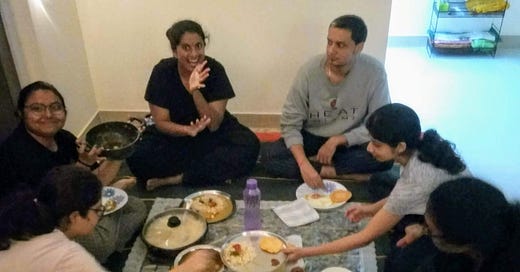They were about 4-5 packers and they were going about their job in their usual frantic manner while I was hopping between the rooms trying to oversee all of it.
That's when I saw one of the packers drinking water from my steel water bottle.
I had been worked up all morning and I reacted more animatedly than I would have otherwise.
'Oh yaar!’, I sighed. ‘I have kept a separate bottle for you all.'
The man shrunk right before me.
I realized right away what had happened. But I didn't know how to tell him that I didn't mean it like that.
I found that other bottle and offered it to him. But he refused the water and carried on with his work.
When we reached the new house, I looked out for him but he was not to be seen. After a while, I asked for the 'blue shirt wale bhaisaab' (the one in the blue shirt). They told me he got off mid-way saying that he had some other work.
**
While growing up, we were not allowed to serve food to ourselves. It was always served to us carefully. It would become an issue even if the plates we are eating from touched the vessel the food is being served from. The vessel full of rice/sambar would become impure (‘enjalu’ in Kannada or ‘jhoota’ in Hindi) and could not be served to anyone else from it. Even as a child, it was baffling to me that we are throwing away perfectly good food just because the vessels came in contact.
We could voice our opinions but we still had to follow the rules.
I grew over it at boarding school. Food was a form of currency there. We would place bets where the loser might have to give the winner ten puris, Saturday's fish/chicken or even an entire year's papads. Food was gleefully passed around from plate to plate with bare hands.
It was liberating to be in a space where enjoying the meal mattered more than anything else.
Even at the cool office full of cool people in the cool city of Bombay, there was a formality to our daily lunching. We ate from our own lunchboxes unless someone had brought a little something special that they wished to offer the others. It was our new colleague M who crossed that boundary. On walking into the office cafeteria, he would first peer into everyone’s plate and ask for a bite from each of us. He was much senior to us and we couldn’t just tell him off. It took a while for the rest of us to get used to him touching our plates and eating food that is already ‘jhoota’.
I was also not able to make sense of his fascination for tasing our ordinary food.
Above: Potluck with friends
In my current organization, lunch times are a community affair and eating by oneself is frowned upon. Before we start, we offer a spoonful of food from our own lunchboxes and accept a spoonful of food from everyone else's. When I was still new, one of the co-founders was eager to have a bite of my khichdi but I had already started eating and the food had become ‘jhoota’ now. ‘Are you worried it is enjalu-fied?’, she laughed and went ahead and took a bite. ‘I have never tasted food from your lunchbox’, she said and then asked me about my cooking process.
B R Ambedkar called it inter-dining1.
Food is at the heart of maintaining caste purity. He felt that people from different communities eating together is a way of overcoming rigid caste structures. Through the community lunch practice at this organization, I have grown to understand the larger need for offering and accepting food from each other’s lunchboxes.
The ingredients in people's lunchboxes also include their religion, caste, class and the pride/shame that come with it.
By accepting each other’s food, we learn to accept each other.
And it is when we are accepted by others, that we learn to accept ourselves.
https://en.wikipedia.org/wiki/Annihilation_of_Caste (PDF versions and audio books are freely available on the internet)
The first draft of this essay was written at the Ochre Sky Stories Writing Circle -
with Natasha Badhwar and Raju Tai





Thank you for writing this, Karthik! Loved how the essay traversed from the personal to the professional and finally reached the political, showing how interconnected it all is :)
This story is a masterclass in how personal writing moves into the global big picture. I had had such a 'wow' moment when I first read it at OSC!